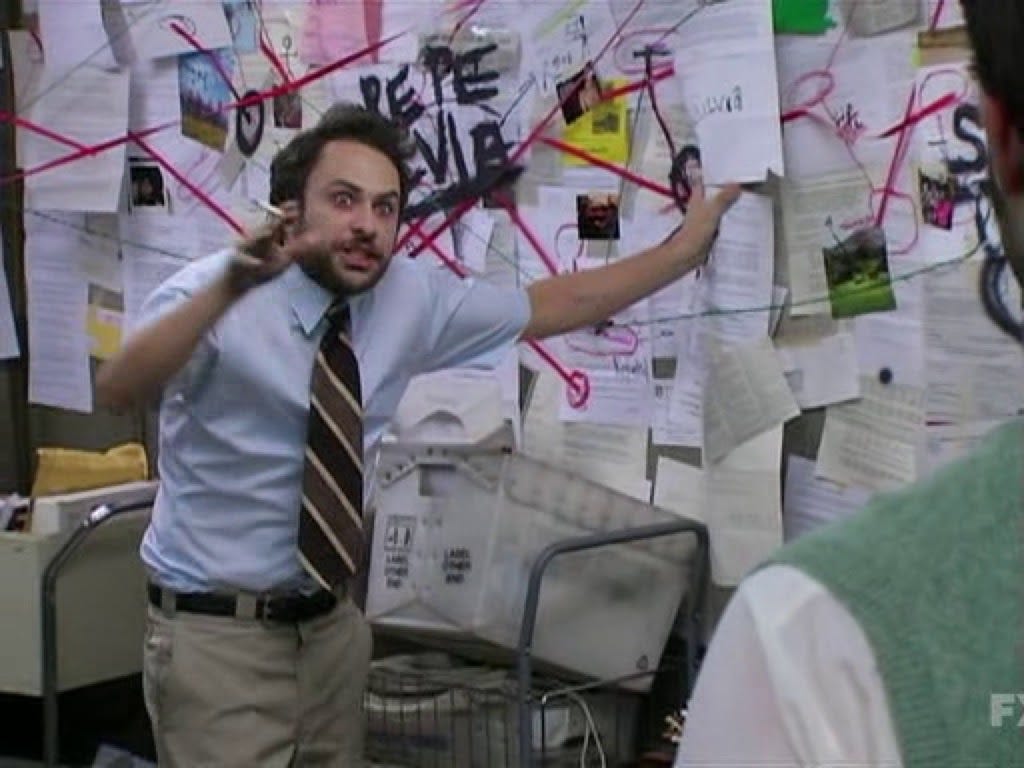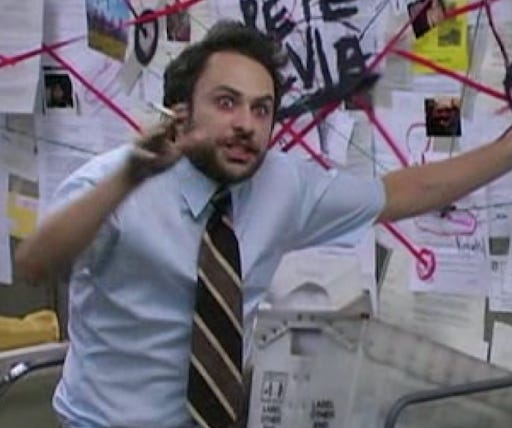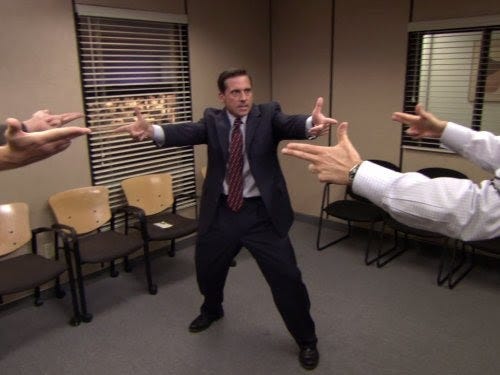Hello, thank you for reading! First, some business.
One:


Two:


Three: If you’d like to support the free Moon Crew newsletter, free Shutdown Fullcast universe, and so forth, you’re welcome to make a donation in the amount of your choice at our Ko-fi page. We’re hoping to have some news soon on a bonus or two we’d like to offer donors.
You know the meme where the guy from It’s Always Sunny figures it all out, at the cost of his own sanity?

That meme is how I feel every time I try to talk to someone about the state of college football. My biggest mindfuck is when people don’t see the interconnected nature of all this.
(In case you’ve never watched the scene, it regards the Postal Service and layoffs, with one character saying to the other: “We’ve lost our jobs? That means we’ve lost our health insurance, which means all of this is for nothing.” Pertinent to basically everything.)
Everything is connected. It all goes back to college athletics failing the people who make the whole machine fly: the athletes. Colleges pretend athletes are students when convenient, but that is extremely inconvenient at the moment.
Ok, these players are adults. Wouldn’t the easiest solution be to just let ‘em sign pandemic waivers?
Well, Congress told the NCAA to cut that shit out.
Why would the NCAA cut said shit out?
Because these things are connected. They want an antitrust exemption from Congress.
Why do they want that?
This exemption probably woulda come in handy in the mid-1980s, for example, when the NCAA lost the Supreme Court case that forbade them from restricting TV deals. That case opened the floodgates to college football becoming a conference-controlled media conglomerate … and to players making pittances while seeing everyone else make millions.
(You can read about that case in The Sinful Seven: Sci-Fi Western Legends of the NCAA. It’s a good book, in my opinion.)
The NCAA wants an exemption in 2020 so they can cap the money an athlete could make from his or her name/image/likeness, money that would challenge the central idea of amateurism. That’s a full circle of connections already. You see it, don’t you?

So this is all about the NCAA wanting money as usual?
Not just the NCAA! The sport has spent much of 2020 on the brink of comprehensive postponement because no one is in charge. The conferences sometimes work in parallel while overlapping, while saying they aren’t overlapping, even though we know they are overlapping.
The Pac-12 might say it made its postponement decision in a silo, but it followed the Big Ten’s lead, albeit while actually showing its work.
The SEC, Big 12, and ACC are demonstrating that they want to play, but their status has a lot to do with what the Pac-12 and Big Ten did, whether they want to admit it or not. The Pac-12 and Big Ten canceling early gave the other three the ability to send one of two messages:
If football stops: “Hey, we tried harder than those other conferences did, but it was impossible.”
If football continues: “We stayed the course through uncertainty and didn’t make a rash decision!” (This one’s boosted by the fallout from the Big Ten’s communication failures.)
And one of the remaining three Power 5s postponing would be the tipping point for the rest, because it’s all connected. If the SEC cancels, the ACC is absolutely gonna cancel. The SEC, Big 12, and ACC remain in this meme:

Yeah, but the Big Ten seems to be going back on its deci—


The coaches can petition ‘til they’re blue in the face, but this is the presidents’ call. However, I would bet the SEC, Big 12, and ACC decisions to keep going have contributed to the very hard feelings among Big Ten coaches and parents, because the connection goes both ways.
I’m sure the Big Ten thought they’d be the leaders and legends of pandemic response, and everyone else would follow. That was not unreasonable, particularly once the Pac-12 and Mountain West canceled.
But it’s now been weeks, so the Big Ten looks like they jumped the gun, counter-forcing the Big Ten into a messy public debate with itself.
Why can’t one person just tell all these conferences what to do?
The NCAA president’s sway doesn’t really extend to major football. The conferences want to be their own bosses when convenient (there’s that word again), but now it’s a big problem.
That seems like a weird way to structure something that generates hundreds of millions in revenue. Why didn’t anyone ever, ya know, fix this?
We’ve long kicked cans down the road. The 150-year problem of amateurism — something the powers were too lazy, racist, or incompetent to change — is coming to a head in 2020.
Players asserted their rights about a month ago in a broad package of demands, and over the course of a few hours, they combined movements into a call for something that might resemble a players’ union.
Among the high-profile leaders was Justin Fields. He and his Ohio State teammates presumably signed workout waivers back in June, but that was before Congress told the NCAA to tell Ohio State to cut that shit out. But even if those players got some sort of collective bargaining group, that might take a long time to fix things, because they’d probably have to bargain with conferences/schools individually, because there is no central leadership. That was wrestled away when … the NCAA lost that court case in the 1980s. Remember, it’s all connected.

So football’s a mess. Once they figure that out, everything’s fine, right?
Even if football can get through a pandemic season, can volleyball? What about soccer?
And because we have to pretend football is just like volleyball, despite their wildly differing influence on an athletic department’s bottom line, we lump ‘em together. An athletic director cannot say football needs to make it to Thanksgiving, whether or not field hockey can. They might want to, because of economics, but it’d be the quiet part out loud.
So we’re circling back to money?
Remember how athletes are allegedly just like any other students? Consider that this country has made higher education insanely expensive. Side effects include huge salaries and facility budgets throughout academia.
How’s that connect to sports?
As tuition costs balloon, athletic departments have something to point at when claiming they finish in the red and thus can’t afford to pay money to players. Scholarships are big numbers, after all.
At the same time, schools need that tuition money from non-athletes (and athletes, in many cases), so they have to *checks notes* trust college students to follow rules. Acknowledging students could distance-learn for a pandemic semester doesn’t exactly justify lofty tuition fees.
So the solution was to bring everyone back to campus and hope they stayed safe, at least through drop/add days, thus securing the bag.
And then this happened:
NC State went virtual shortly after clusters emerged on campus.
Notre Dame contact-traced 50 cases to one (1) party.
Nick Saban scolded Alabama students for not wearing masks.
Nearly one in three tests at UNC came back positive as of August 24th.
On the same day, USC announced over 100 students are in quarantine.
Auburn players called out their non-mask-wearing peers, because they have some insights that their fellow students either don’t possess or don’t care to use.
At Texas Tech, 21 players tested positive.
And that’s just a taste.
How’s that connect to sports?
If individual campuses have cases spiking up in down, can we safely shuttle thousands of players back and forth between these campuses weekly?

You gonna be ok, big guy?
It’s exhausting, thinking about this and even writing this here newsletter. You can’t talk about X without thinking about Y, which leads to Z, and of course you must consider A-W.
As always, college football explains America pretty well. Move from federal government —> state governments —> universities —> athletic departments —> football, and you see how shit trickled downhill and come to rest smack dab on the 50-yard line.
Reaping, sowing, etc. The last few months have been a group project gone very wrong. That’s why those who understand the pieces have been looking like this all summer:






I have thoroughly enjoyed seeing the response from players. The ones deciding to play (commendable) are raising thier voices to try and protect thier team and the game they love while supporting the players opting out (also commendable). The buy-in from coaches is great too; as a huge GT fan I've enjoyed seeing what Geoff Collins is doing with the Yellow Jackets and thier practices and workouts.